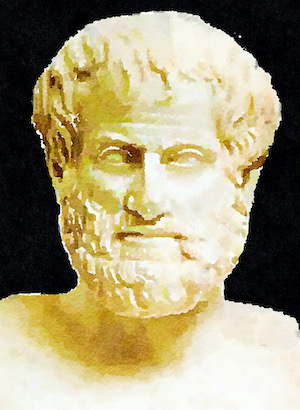
One of the most influential figures in the history of Western thought, Aristotle (384–322 BCE), was born in the Greek colony of Stagira, on the Chalcidice peninsula. His father was Amyntas III of Macedon's court physician. In 367, he travelled to Athens to study at Plato's Academy and remained there until Plato died in 347.
When Speusippus succeeded Plato as head of the Academy, Aristotle left Athens. He spent time in Asia Minor, where he continued his philosophical activity and developed an interest in marine biology.
After three years at Assos, where the ruler, Hermeias, a former Academic, had opened his own Academy, Aristotle moved to the nearby island of Lesbos. He spent two years working with Theophrastus, who had also been associated with Plato's Academy. While he was in Lesbos, Aristotle married Hermeias' niece, Pythias. The union produced a daughter, also named Pythias.
Aristotle left Lesbos in 343, bound for the Macedonian capital, Pella. Philip II asked him to tutor the thirteen-year-old who would later be known as Alexander the Great. While Aristotle's influence on Alexander's development and ideas has fascinated later writers, the appointment may not have lasted much more than two years. By the time he was fifteen, Alexander was already serving as his father's deputy commander.
On the other hand, their association may well have continued beyond that point. Little is known about Aristotle's life between 341 and 33. However, he probably remained in Stagira or Macedon before returning to Athens in 335.
On his return to Athens, Aristotle founded the Lyceum, named for its proximity to the temple of Apollo Lyceius. Over the next twelve years, his followers became known as 'peripatetics', allegedly due to their teacher's habit of walking up and down while lecturing.
Those attending the Lyceum researched a wide range of subjects, all of which interested Aristotle himself. As a result, the Lyceum collected manuscripts, assembling what may have been antiquity's first great library. In some accounts, the collection formed the basis of the great library later assembled at Alexandria.
During this stay in Athens, Aristotle's wife, Pythias, died. A new relationship with Herpyllis, whose origins and exact relationship to Aristotle remain obscure, produced children, including a son named for Aristotle's father, Nicomachus.
After thirteen years in Athens, a resurgence of the always-simmering anti-Macedonian sentiment prompted Aristotle top to leave the city after Alexander died in Babylon in 323.
Allegations of impiety and his connections to Macedon meant Aristotle would have held reasonable fears for his safety. He would have had Socrates' fate in mind when he remarked that he saw no reason to allow Athens to commit a second sin against philosophy. He found refuge at Chalcis in Euboea, where he died the following year.
A prodigious researcher and, apparently, a prolific writer, Aristotle left a vast body of work, perhaps as many as two-hundred titles, although only about thirty have survived. Those surviving works cover a wide range of disciplines. His interests covered virtually every field of knowledge: biology, ethics, logic, metaphysics, poetry, physics, politics, psychology, rhetoric and zoology. However, most of his teachings only survived as unpublished lecture notes or students' textbooks edited by Andronicus of Rhodes in the middle of the first century BCE
Those works exert an enormous influence on philosophy in medieval Europe, the Islamic world and later intellectual and scientific tradition.
Key texts include:
- Metaphysics ("the [writings] after the Physics"),
- Nicomachean Ethics (ten books, initially separate scrolls, based on notes from his lectures at the Lyceum, dedicated to either his father or son, both of whom were named Nicomachus),
- Politics (eight books following on from the Nicomachean Ethics to deal with the "philosophy of human affairs"),
- Poetics (De Poetica, the earliest surviving work of dramatic and literary theory, lost to the Western world until an early Renaissance Latin translation of an Arabic version by Averroes.)
- De Anima (a major treatise centred on the different kinds of souls possessed by living things).
- and the Organon (six works on logic).
Sources:
Chambers Biographical Dictionary
Stanford Encyclopedia of Philosophy (https://plato.stanford.edu/entries/aristotle/)